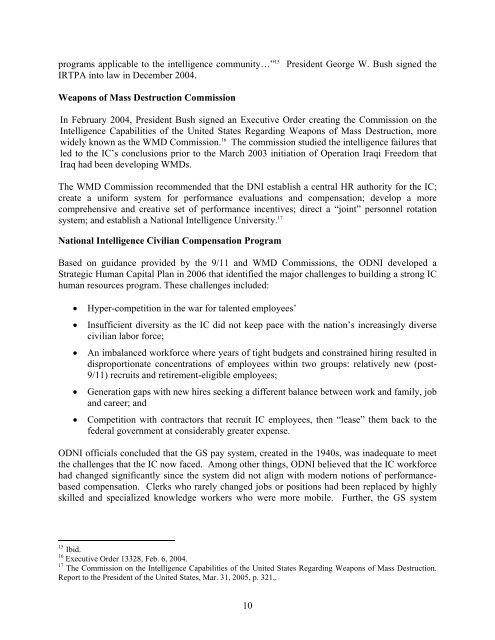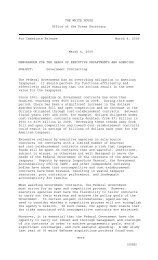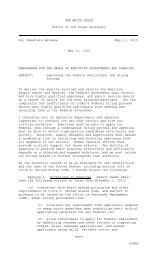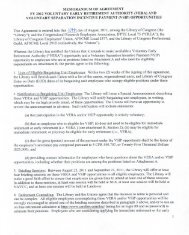Report - Government Executive
Report - Government Executive
Report - Government Executive
Create successful ePaper yourself
Turn your PDF publications into a flip-book with our unique Google optimized e-Paper software.
programs applicable to the intelligence community…” 15 President George W. Bush signed the<br />
IRTPA into law in December 2004.<br />
Weapons of Mass Destruction Commission<br />
In February 2004, President Bush signed an <strong>Executive</strong> Order creating the Commission on the<br />
Intelligence Capabilities of the United States Regarding Weapons of Mass Destruction, more<br />
widely known as the WMD Commission. 16 The commission studied the intelligence failures that<br />
led to the IC’s conclusions prior to the March 2003 initiation of Operation Iraqi Freedom that<br />
Iraq had been developing WMDs.<br />
The WMD Commission recommended that the DNI establish a central HR authority for the IC;<br />
create a uniform system for performance evaluations and compensation; develop a more<br />
comprehensive and creative set of performance incentives; direct a “joint” personnel rotation<br />
system; and establish a National Intelligence University. 17<br />
National Intelligence Civilian Compensation Program<br />
Based on guidance provided by the 9/11 and WMD Commissions, the ODNI developed a<br />
Strategic Human Capital Plan in 2006 that identified the major challenges to building a strong IC<br />
human resources program. These challenges included:<br />
• Hyper-competition in the war for talented employees’<br />
• Insufficient diversity as the IC did not keep pace with the nation’s increasingly diverse<br />
civilian labor force;<br />
• An imbalanced workforce where years of tight budgets and constrained hiring resulted in<br />
disproportionate concentrations of employees within two groups: relatively new (post-<br />
9/11) recruits and retirement-eligible employees;<br />
• Generation gaps with new hires seeking a different balance between work and family, job<br />
and career; and<br />
• Competition with contractors that recruit IC employees, then “lease” them back to the<br />
federal government at considerably greater expense.<br />
ODNI officials concluded that the GS pay system, created in the 1940s, was inadequate to meet<br />
the challenges that the IC now faced. Among other things, ODNI believed that the IC workforce<br />
had changed significantly since the system did not align with modern notions of performancebased<br />
compensation. Clerks who rarely changed jobs or positions had been replaced by highly<br />
skilled and specialized knowledge workers who were more mobile. Further, the GS system<br />
15<br />
Ibid.<br />
16 <strong>Executive</strong> Order 13328, Feb. 6, 2004.<br />
17 The Commission on the Intelligence Capabilities of the United States Regarding Weapons of Mass Destruction.<br />
<strong>Report</strong> to the President of the United States, Mar. 31, 2005, p. 321,.<br />
10













